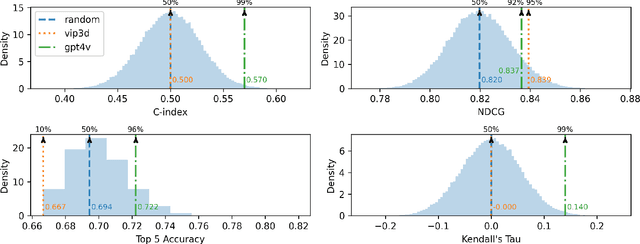Kei Ikemura
Hard Cases Detection in Motion Prediction by Vision-Language Foundation Models
May 31, 2024



Abstract:Addressing hard cases in autonomous driving, such as anomalous road users, extreme weather conditions, and complex traffic interactions, presents significant challenges. To ensure safety, it is crucial to detect and manage these scenarios effectively for autonomous driving systems. However, the rarity and high-risk nature of these cases demand extensive, diverse datasets for training robust models. Vision-Language Foundation Models (VLMs) have shown remarkable zero-shot capabilities as being trained on extensive datasets. This work explores the potential of VLMs in detecting hard cases in autonomous driving. We demonstrate the capability of VLMs such as GPT-4v in detecting hard cases in traffic participant motion prediction on both agent and scenario levels. We introduce a feasible pipeline where VLMs, fed with sequential image frames with designed prompts, effectively identify challenging agents or scenarios, which are verified by existing prediction models. Moreover, by taking advantage of this detection of hard cases by VLMs, we further improve the training efficiency of the existing motion prediction pipeline by performing data selection for the training samples suggested by GPT. We show the effectiveness and feasibility of our pipeline incorporating VLMs with state-of-the-art methods on NuScenes datasets. The code is accessible at https://github.com/KTH-RPL/Detect_VLM.
Robust Depth Enhancement via Polarization Prompt Fusion Tuning
Apr 05, 2024Abstract:Existing depth sensors are imperfect and may provide inaccurate depth values in challenging scenarios, such as in the presence of transparent or reflective objects. In this work, we present a general framework that leverages polarization imaging to improve inaccurate depth measurements from various depth sensors. Previous polarization-based depth enhancement methods focus on utilizing pure physics-based formulas for a single sensor. In contrast, our method first adopts a learning-based strategy where a neural network is trained to estimate a dense and complete depth map from polarization data and a sensor depth map from different sensors. To further improve the performance, we propose a Polarization Prompt Fusion Tuning (PPFT) strategy to effectively utilize RGB-based models pre-trained on large-scale datasets, as the size of the polarization dataset is limited to train a strong model from scratch. We conducted extensive experiments on a public dataset, and the results demonstrate that the proposed method performs favorably compared to existing depth enhancement baselines. Code and demos are available at https://lastbasket.github.io/PPFT/.
 Add to Chrome
Add to Chrome Add to Firefox
Add to Firefox Add to Edge
Add to Edge